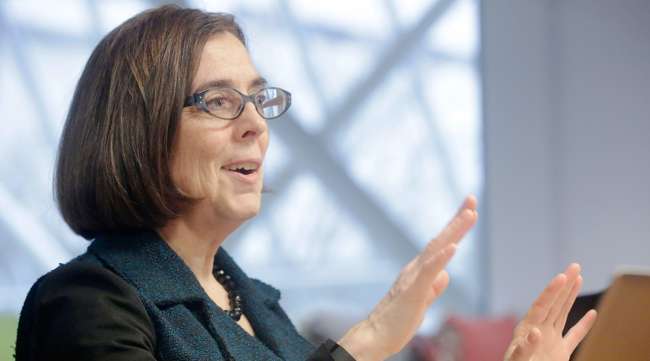Oregon’s $5.3 Billion Transportation Plan Clears Final Hurdle

SALEM, Ore. — Oregon’s most ambitious highway upgrades in a generation won final approval from the Legislature on July 6. With a vote of 22-7, the Senate passed House Bill 2017, a $5.3 billion package of taxes and fees to fund congestion-reducing projects, highway and bridge improvements, transit projects and more around the state.
Gov. Kate Brown, who named a highway deal as one of her three biggest priorities, tweeted that she looks forward to signing it.
A 4-cent gas tax hike, $16 vehicle registration fee increase and 0.1% payroll tax and 0.5% tax on new car sales will kick in next year, provided opponents don’t get the question referred to the ballot or overturned in court. Some have said they will try.
But for now, lawmakers are heralding the bill’s passage as a watershed moment for legislators and Oregonians.
“This is probably the most comprehensive transportation bill that the Oregon Legislature has ever passed,” said Sen. Lee Beyer (D-Springfield), co-chairman of a special transportation committee that crafted the bill. He said the proposal is “truly a remarkable piece of work” that “affects every corner of this state.”
“This is the piece of legislation that the 2017 session will be known for, 20, 30, 40, 50 years from now,” said Sen. Ron Monroe (D-Portland). “That’s how important it is. That’s how big it is.”
Since Brown took office in 2015, lawmakers have been working to pass a transportation proposal, citing the poor state of Oregon’s infrastructure and mounting Portland traffic problems as reason more funds are needed. Negotiations failed then, but lawmakers triumphed this year.
To get there, lawmakers agreed to increase the state’s gas tax incrementally by 10 cents over the next eight years. Vehicle registration will be priced on a tiered system, where owners of fuel-efficient and electric cars pay more, since those cars contribute little or nothing to gas tax revenues.
The tax on new car sales will fund rebates of up to $2,500 for purchasing or leasing new all-electric cars. A $15 tax on the sale of adult bicycles that cost $200 or more will fund bike and pedestrian paths. And the payroll tax will fund more than $1 billion of public transit upgrades throughout the state; that money can’t be used for light rail projects.
Three major Metro-area projects are set up for funding under the plan, and may be funded in part with rush-hour tolls:
•Adding lanes to Interstate 5 through the Rose Quarter.
•Adding lanes to I-205 and replacing the Abernethy Bridge.
•Adding lanes to Oregon Highway 217.
Sen. Brian Boquist (R-Dallas), another member of the special transportation committee, said the plan was approved only after more than 50 public hearings.
He hinted at the “political hurdles” lawmakers had to clear — notably the forces behind a deal cut by Democrats, Republicans and Brown to cap costs of the state’s clean fuels law, which Republicans feel increases the price of gas. But the bill passed July 7 moves the state ahead, Boquist said, and people throughout Oregon will benefit by way of safer roads and less traffic.
Distributed by Tribune Content Agency, LLC




